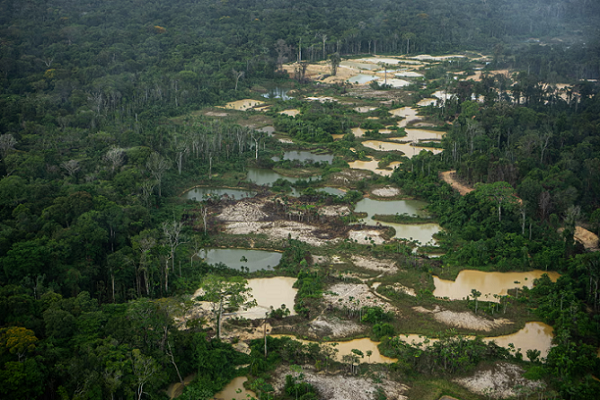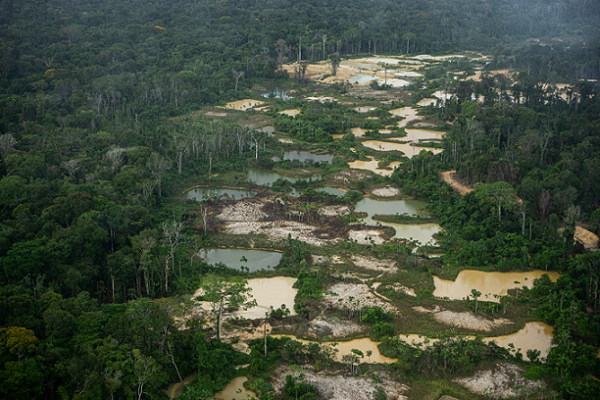
The full title of this article is “‘Dirty political games’: Suriname is selling its gold and timber – at the cost of tribal land rights.” Bram Ebus (in Pokigron, Suriname) reports for The Guardian. All photographs by Bram Ebus. He writes, “Communities such as the Saamaka are vocal in opposition to increased mining and logging – but has the country’s claim to fame as the most forested in the world already been fatally undermined?”
“Welcome to Suriname – the most forested country in the world!” reads a billboard above the entrance of Suriname’s international airport terminal. Numerous signs remind travellers that more than 90% of its territory is covered by lush jungle, and the country takes pride in its environmental track record.
However, legal and illegal gold mining and expanding logging operations increasingly threaten this statistic, putting forests at risk and undermining the rights of tribal and Indigenous people to the land.
As it approaches its 50th year of independence, Suriname is the only Latin American country yet to adopt a legal framework recognising Maroon and Indigenous people’s collective rights.
Since 2007, the Inter-American Commission on Human Rights (IACHR) has ruled on several occasions that Suriname should suspend harmful economic activities and recognise and respect the territorial boundaries of about 30,000 Saamaka people, one of six main groups of Surinamese Maroon people. However, this verdict remains unheeded despite its binding nature. Since the initial IACHR judgment, deforestation in Saamaka lands has increased fourfold.
Concessions have also been granted to multinational mining companies and the timber industry, upsetting and dividing Indigenous and tribal communities with historical claims to collective lands. In a helicopter fly-over, the Guardian observes how an endless jungle has become scarred, with gold mining devouring pristine Amazon rainforest and roads carving open territories for loggers.
“If we want to maintain the status of the most forested country in the world, we must make a drastic change in our forest governance,” says Hugo Jabini, a lawyer and a Maroon community leader. Jabini is a spokesperson for the Association of Saamaka Authorities (ASA) and represented Maroon communities in the 2007 IACHR case against the Surinamese state, demanding recognition for traditional lands and cessation of extractive activities destroying their forests. “This is a gross violation of an ancient territory our ancestors have secured,” says Jabini. “We feel betrayed because we did not receive our freedom as a gift. We fought for it.”
The Saamaka people in Suriname maintain a traditional lifestyle, living from fishing, hunting, food collection and ancestral medicine. They have a historical claim to lands after fleeing slavery in the coastal plantations, repelling colonial armed forces and securing autonomy in the country’s interior. Despite this, their rights have been systematically violated for 60 years.
During the construction of the Afobaka hydroelectric dam in the early 1960s, Saamaka communities were relocated, and later were displaced, tortured and killed during the 1986-1992 Surinamese interior war, when the current vice-president, Ronny Bruinswijk, led a rebellion against the government of Dési Bouterse, who has since been convicted of killing 15 of his opponents.
The war has left scars. In Pokigron, a Maroon village, elders vividly recall atrocities and tribal leaders decry poverty, a lack of rights and state neglect, saying Saamaka territories are often violated as timber and gold mining operations have entered traditional lands. “The government has not honoured agreements and engaged in dirty political games with the Maroon communities,” says Gillie Huur, a Saamaka leader.
The government has been criticised for allowing multinationals to operate in Saamaka territory. For example, in 2023, the Chinese company Zijin Mining bought Rosebel, a massive open-cast goldmine in Brokopondo, north-east Suriname, from the Canadian Iamgold. Part of the mining operations – though not all – overlap with Saamaka land. But wherever they are sited the pits and wastewater lakes create vast, potentially polluting, gouges in the landscape.
Unauthorised mining has also become a problem in the area, and in November last year, 14 “informal” miners were killed in a tunnel collapse at an illegal mine in an area of the Rosebel site not belonging to Zijin Mining.
Without access to formal employment markets, many Saamakans resort to working in illegal gold mines. There they face labour abuses and work with chemicals and heavy metals which can affect their health. The environmental impact is as disastrous as the human one: in order to hunt for gold, forest cover is razed to provide access to the subsoil and toxic substances including mercury – officially prohibited for extraction but nevertheless widely used – are used to process ore, resulting in long-term environmental damage.
A 53-year-old independent Saamaka miner, who prefers to remain anonymous, explains how they use mercury to extract gold and displays a small bottle of the liquid metal, which is toxic when inhaled or touched and can cause damage to the nervous system.
Independent Chinese miners have also built a camp near a town called White House. They have begun processing ore previously treated with mercury by the Saamakans, instead using cyanide, which increases toxicity but results in higher yields.
Around White House, backhoes plough through a moonscape dotted with mining pits and lagoons where Saamaka men extract fine concentrations of gold from the earth. The miners eat and sleep in makeshift shacks constructed out of wood and sheets of plastic, surrounded by mining pits filled with contaminated water. [. . .]
Another threat, according to Saamakan leaders, is timber concessions, such as the one owned by Palmera Hout NV. Under the UN Declaration on the Rights of Indigenous Peoples, ethnic communities such as the Saamakans have the right to “free, prior and informed consent” and must be consulted before new timber concessions are granted. However, the government did not formally consult before authorising Palmera Hout NV and other operations in ancestral lands, according to Saamaka leaders.
The Guardian has contacted Suriname’s Ministry of Natural Resources and Ministry of Land and Forest Management but received no response to the allegations. [. . .]
For full article, see https://www.theguardian.com/global-development/2024/feb/21/suriname-loggers-miners-forests-deforestation-saamaka
[Photo above, and all photos, by Bram Ebus/The Guardian.] Sprawling into both traditional Saamaka lands and areas overlapping with logging concessions, wildcat illegal gold mining projects exacerbate tensions and threaten the environment.]
The full title of this article is “‘Dirty political games’: Suriname is selling its gold and timber – at the cost of tribal land rights.” Bram Ebus (in Pokigron, Suriname) reports for The Guardian. All photographs by Bram Ebus. He writes, “Communities such as the Saamaka are vocal in opposition to increased mining and logging







